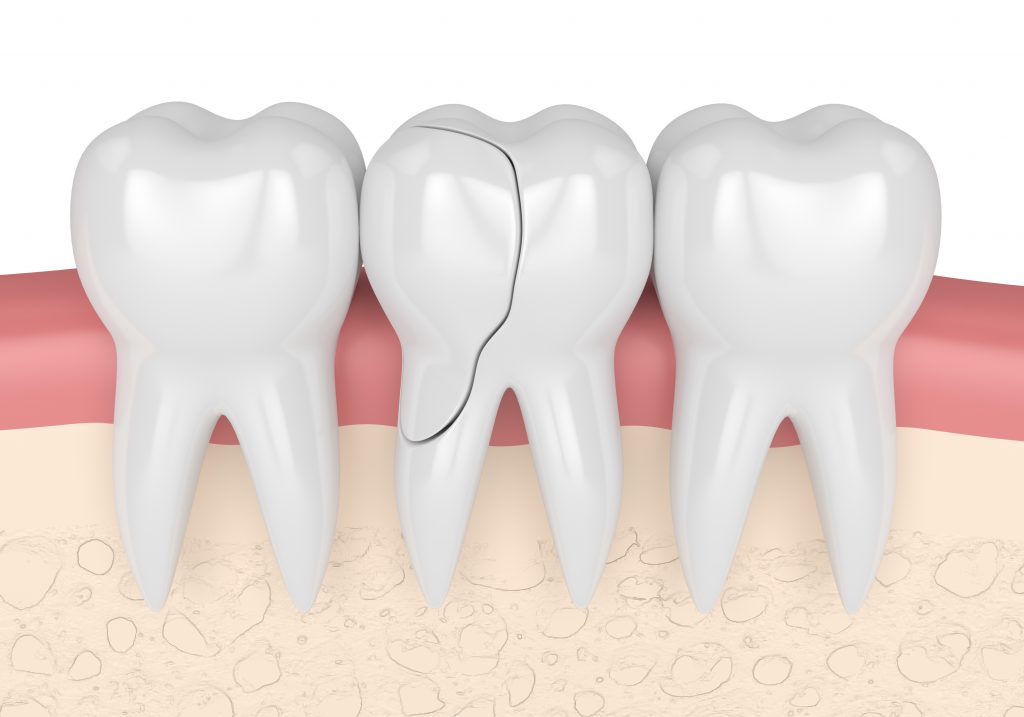
When it comes to prosthodontics, San Diego patients can struggle with major issues like a cracked molar (back tooth.) Cracked molars aren’t uncommon, but you tend to hear about them less often than you do other types of dental emergencies, such as chipped front teeth.
Why Do Teeth Crack?
There are several reasons why a molar may crack or break. Some are preventable with early intervention, while others are not. Here are some of the most common causes that we see in our San Diego practice:
Large, untreated area of tooth decay.
Active cavities continually expand into the surrounding, healthy tooth structure unless they’re treated. While decay may not be painful, it doesn’t mean the cavity isn’t rapidly expanding. As cavities become large, the outer shell of enamel thins out and becomes especially brittle. Until one day, you bite down, and the molar cracks apart entirely.
Older, large amalgam filling that needs to be replaced.
Silver fillings are very useful for filling large cavities or teeth that are difficult to keep dry, such as molars. But over time, fillings may start to leak and pull away from the tooth. This process creates an open margin around the filling where bacteria can seep into the tooth. If the filling isn’t replaced or upgraded to a crown, it’s only a matter of time until the tooth cracks apart around the filling when you bite or chew.
Biting down on something hard.
Perhaps it’s a fork, a tongue piercing, or using your teeth as tools to open something. Biting down on an extremely hard object can easily cause severe tooth fractures or broken dental work.
How to Tell if Your Tooth is Cracked
Sometimes cracked tooth symptoms are extremely obvious, and other times they’re so subtle that it’s hard to tell whether a tooth is cracked or not.
Depending on the extent of damage to your cracked tooth, symptoms may or may not include:
- Pain or throbbing
- Sensitivity to biting pressure (or when you release the pressure)
- Rough edges you can feel with your tongue
- Visible fractures
- Pieces of tooth falling out of your mouth
When you visit Downtown Dental Specialty to check on your cracked tooth symptoms, we will take an X-ray and visually examine your tooth. But since some cracks in teeth are invisible to the naked eye, we will also use a special tool to have you bite down on certain points of the suspected tooth. This can help us pinpoint whether there is a hairline fracture somewhere in the tooth or tooth root.
First Steps if You Have a Cracked Molar
If you suspect that you have a cracked molar, it is extremely important not to chew on that side of your mouth. Otherwise, you could inadvertently damage the tooth and cause more tooth structures to break off or crack.
To help manage discomfort, we recommend taking Motrin (ibuprofen) as directed. The anti-inflammatory effects will help ease hypersensitive tooth nerves to reduce pain until you can seek out treatment.
Although it’s an aged analogy, cracked teeth can easily be compared to a “run” in an old pair of nylon stockings. Once it starts, it can easily grow and get out of hand.
Contact our office immediately if you suspect your tooth is cracked.
Cracked Tooth Treatment
The best treatment for cracked teeth will depend on how deep the crack is. If the fracture is limited to the crown (the portion of the tooth above the gums) our specialist may recommend a restorative porcelain crown over the tooth. The restorative crown will protect the compromised tooth and distribute biting pressure evenly, preventing additional breakage.
For cracks that extend deeper into the tooth structure or nerve, root canal therapy may also be required in addition to the crown.
Severe cracks that extend well into the root that cannot be restored are best managed by removing the tooth entirely and replacing it with a dental implant.
Prosthodontics San Diego
Downtown Dental Specialty offers advanced cracked tooth treatment in San Diego. If you’re experiencing cracked tooth symptoms, contact us as soon as possible. We offer advanced prosthodontics (San Diego) to help restore your smile, regardless of how extensive the damage may be.
New patients are always welcome. Contact us today.


